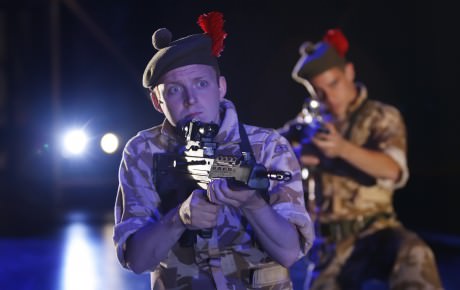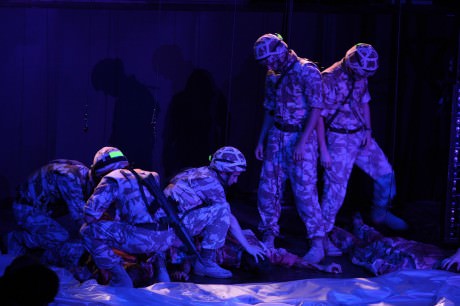Last October, I had the great privilege of visiting Scotland on work travel. On a day off, I climbed up the very long set of stairs and visited the Edinburgh Castle and the National War Museum Scotland, which is housed on the castle grounds. The long tradition of Scottish military service was made clear to me during that incredible visit. The National Theatre of Scotland’s production of Black Watch, currently being presented by the Shakespeare Theatre Company, further elucidated my understanding of Scottish military culture through its depiction of the Black Watch’s (oldest Highland regiment) service in Iraq in support of the Coalition. Through this play, it becomes clear that the soldiers’ individual and collective experience of war is something that transcends nation-state boundaries. At the same time, the unique history of the Black Watch regiment also influences how the Scottish soldiers served in Iraq and what they brought to and took away from that tumultuous experience.

Surely, several theatrical pieces have tackled the subject of the Iraq War in recent years. The propensity of most Iraq War plays has been to focus less on the soldiers themselves, but rather on the nature of the conflict at hand and how red and green forces engage in brutal, asymmetric warfare. Writer Gregory Burke has decided to tell his story in a non-linear way set in the context of the young soldiers recalling the war experience with a journalist (Robert Jack) after they return home. Through an intense physical production, audience members can experience what it is like to be a Scottish soldier on the ground in some of the most dangerous sub-regions of Iraq. The soldiers are tasked with supporting the American troops. They are in theater not to defend Scotland (as has mostly been the tradition of the Black Watch), but to execute an, at times, mystifying political agenda – something that influences how the soldiers perceive their mission and define success or lack thereof.
The strength of this play, wonderfully directed by John Tiffany, lies not within the structure of script or even how it conveys a larger social message about war. Issues such as post-traumatic stress and injuries and deaths as a result of a vehicle-borne improvised explosive device (VBIED) attack, both mainstays in modern warfare, are explored, but do not add anything new to what we already know. Perhaps it’s because we as audience members have heard these stories so many times in recent years that they eventually lose impact. When the play focuses on these elements, it’s difficult to see what makes the Black Watch different than other military units. After all, those experiences transcend cultures and state boundaries. Perhaps that’s the point, but I was less moved when these larger issues were examined.
What makes the show unique and largely successful is how the soldiers’ experiences in Iraq are put into the context of the larger history of the Black Watch regiment. Therefore, I found myself drawn to the elements of the play that explore the history of the legendary regiment more than the ones that mostly examine the realities of the war in Iraq. At a particular emotional point in the play, Ryan Fletcher, as Cammy (a regiment member, who also serves as an occasional narrator), gives the audience a history lesson about the Black Watch and how uniforms (exquisitely designed by Jessica Brettle) and pageantry have influenced how the regiment acts and how it’s perceived. Through a series of innovative choreography and costume changes (superbly executed by the ensemble cast), the reality that the young soldiers are warriors in a long line of many warriors that came before them is presented with astonishing theatricality although certainly not devoid of emotion or intent. Several movement and music-based moments throughout the course of the play (including the playing of the bagpipes) do well to highlight the tradition the young men are carrying forth.
Two other reasons why this show works are the physical production elements and strong acting. Together, they create a dazzling display of theatricality that’s certainly worthy of all of the accolades this play has received. Loud explosions, an innovative use of other sound effects and intense lighting (courtesy of Gareth Fry and Colin Grenfell, respectively), graceful yet intense movements (by Steven Hoggett and Vicki Manderson), and eye-catching projections (by Leo Warner and Mark Grimmer) create a war-like atmosphere that is visually stimulating and a bit unnerving. One particularly “production-heavy” moment in the play is the intense VBIED attack scene, which makes good use of minimal yet functional set elements (designed by Laura Hopkins). This stunning scene is made all the more effective due to the actors’ realistic and purposeful emotions as they portray several soldiers reeling from the loss of their comrades, but still committed to their operational task.
Along with the charming and intense Ryan Fletcher, Richard Rankin (Granty), Adam McNamara (Rossco), Chris Starkie (Stewarty), Cameron Barnes (Macca), Gavin Jon Wright (Nabsy), Robert Jack (Writer and Sargeant), Scott Fletcher (Kenzie), Andrew Fraser (Fraz), and Stephen McCole (Officer and Lord Elgin) are integral to the success of this production. Their ensemble acting is astounding and this is a case where the whole is definitely more than the sum of its parts.

I’d recommend this production for its attention to historical, visual, and aural detail and the fine acting. Shakespeare Theatre Company should be commended for bringing the production back once again for Washington, DC audiences to experience. It’s definitely an out of the box kind of show, which is always good in my book!
Running Time: One hour and 55 minutes with no intermission.
The National Theatre of Scotland’s Black Watch plays through October 7, 2012 at the Shakespeare Theatre Company’s Sidney Harman Hall – 610 F Street, NW in Washington, DC. For tickets, call 202-547-1122 or purchase them online.




